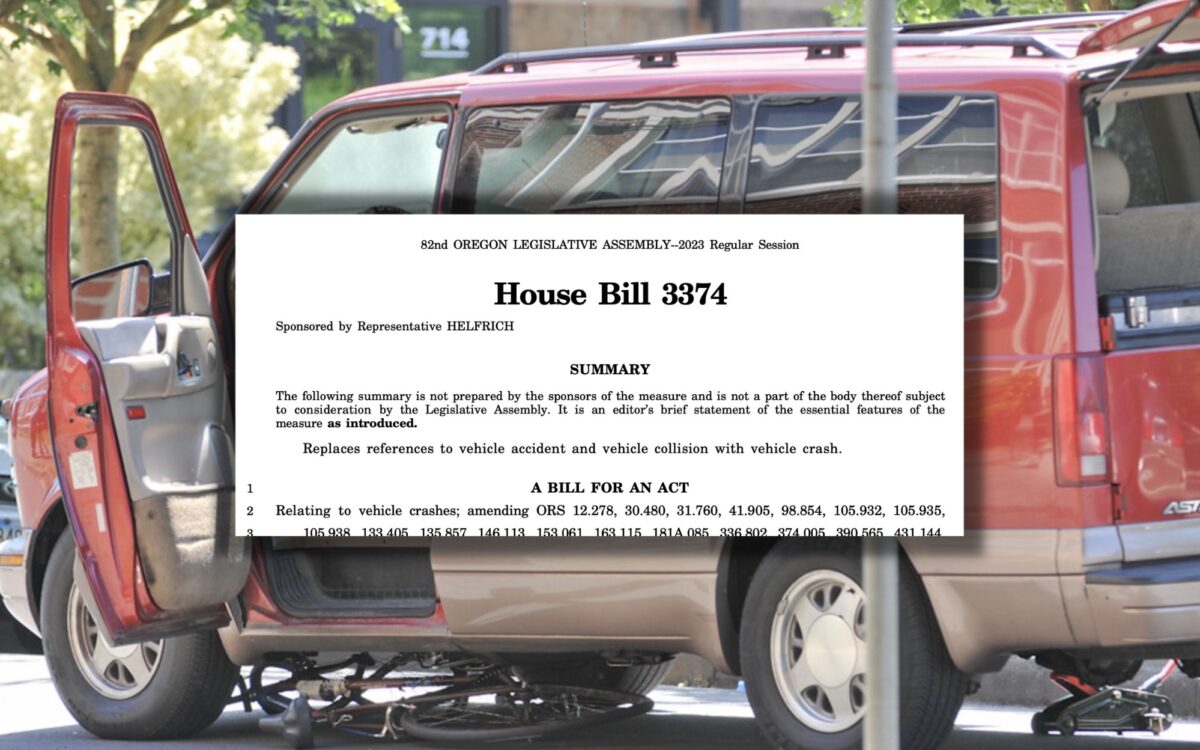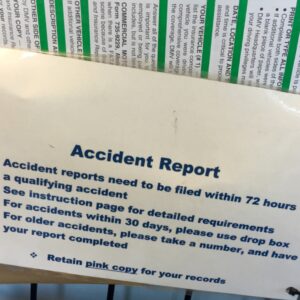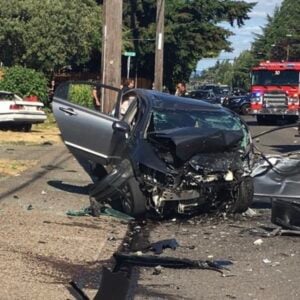If you’ve read BikePortland for a while, you know that we are serious about language and word choice. Way back in 2006 we were one of the first outlets to cover the idea that the way we talk about traffic crashes in America is deeply problematic. Since then, the “crash not accident” movement has grown considerably.
The latest step forward on the march toward making “crash” mainstream is a bill in the Oregon Legislature that seeks to rewrite over 100 existing laws. House Bill 3374 would replace all references to “vehicle accident” and “vehicle collision” in the Oregon Revised Statutes and two sections of Oregon Administrative Rules with “vehicle crash.”
Related: ODOT says US DOT Sec Pete Buttigieg will be Oregon’s ‘new best friend’
The bill is sponsored by House Representative Jeff Helfrich, a Republican who represents the district (52) that covers Hood River, east Multnomah County, Sandy, and Government Camp. Rep. Helfrich lives in Hood River and is a 25-year veteran of the Portland Police Bureau.
Helfrich’s Chief of Staff Natalie Newgard said the bill was introduced on behalf of former House Rep. Ron Noble. Noble is a member of the Governor’s Advisory Committee on DUII and this bill is one of their priorities.
The bill hasn’t been assigned to a committee yet and is still awaiting a public hearing. It should have broad support among transportation safety advocates, many of whom believe that using the term “accident” implies a collision was unavoidable.
The Portland Bureau of Transportation’s Safe Routes to School program wrote in an email newsletter today that using the term “accident” does not align with their goal of making streets safe. “When we use the word ‘accident’ rather than ‘crash,’ we’re implying that a collision was somehow inevitable. We’re not only absolving the person driving from responsibility but also the local transportation agency,” they wrote in the newsletter. “PBOT has strategic commitments to realize Vision Zero … part of [that] strategy is reminding ourselves and our communities that crashes are preventable and predictable.”
We’ll monitor the bill and keep you posted on any developments.








Thanks for reading.
BikePortland has served this community with independent community journalism since 2005. We rely on subscriptions from readers like you to survive. Your financial support is vital in keeping this valuable resource alive and well.
Please subscribe today to strengthen and expand our work.
Talk about a legislative non-event. This is a way of looking busy and signaling that supporters are brimming with virtue while changing exactly nothing.
Accident doesn’t mean “unavoidable” in any relevant context I can think of (air travel, industrial safety, construction, etc.); this is purely a shibboleth, a way of distinguishing believers (“crash”) from non-believers (“accident”).
As for collision… why is that word on the naughty list? Does that also mean “unavoidable”?
I think of “Accident” as unavoidable or unpredictable. If road users are speeding/ texting/ drunk, the collision might have been predictable (Or at least reasonably more likely than if speed/ alcohol/ phones were not issues.)
“I think of ‘Accident’ as unavoidable or unpredictable.”
The FAA’s Office of Accident Investigation & Prevention disagrees. They investigate the causes of air accidents and have managed to make them much less frequent and severe. So not unavoidable.
What is it about car accidents that makes it inappropriate to use the same words we use elsewhere where attributing cause is uncontroversial?
If you are best argument is that the word accident means something different than it means, that’s not very convincing.
That the vast majority of accidents are preventable is somehow drilled into peoples’ skulls everywhere except in Portland. I had literally never heard of this “crash/accident” nonsense until I moved here.
In any case, not all accidents involving vehicles are crashes.
Wasting energy on stuff like this only helps get people interested in actual progress get dismissed as kooks.
Wasting time on stuff like this distracts voters/blog readers from the failures of the political establishment to address chronic societal deficiencies.
You folks are funny. It’s just one of 1000s of bills. It takes relatively very little energy to introduce something like this. And I personally think it’s very important! The “accident” culture is directly related to the record-level of fatal crashes and abusive driving culture we have in Oregon. I hope the bill gets a hearing and gets passed so that we can wipe “accident” out of the books and then culture change can follow.
Can you present the argument for why eradicating “accident” or “collision” from the law books would lead to fewer crashes?
And what is “accident culture”?
I can’t tell if you are being serious or not. Are you saying that you dismiss the idea that word choice reflects and impacts behaviors?
One of the biggest problems in American transportation safety is the normalization of crashes and death and carnage. Calling them “accidents” is how that normalization is perpetuated. This isn’t some fringe conspiracy. The AP recommends not using “accident” in this context, and one of the best books published this year is called “There Are No Accidents” and it lays out how the cultural norm of brushing things off as “accidents” leads to thousands of preventable deaths (in transportation and beyond).
Imagine if someone you loved was hit and killed by a road-raging asshole drunk or high on drugs and then you read in the local news that it was an “accident.” I think that might help you understand this concept.
I don’t dismiss the general idea that word choice can impact behavior, no. But I am very skeptical that legal use of the word “accident” makes crashes more likely or more severe than they would be if we called them something else.
To the extent that collisions (to use another forbidden word) are “normalized” (which I don’t think they are), it’s because they are commonplace. Calling them something different won’t change that. Making them rare might.
Accident does suggest that an event was unintentional (even if the person responsible took actions like drinking that made the undesired outcome statistically more likely), so it would not be appropriate to describe a road rage incident as an accident. Those are intentional acts.
We strongly disagree here. To me, using “accident” allows people to never fully acknowledge their role — or the system’s role — in what happened and therefore it does lead to making the systemic outcomes more likely. We use the term accident to describe lightning strikes and car crashes — when the former is an act of nature and the latter is the result of many distinct decisions by humans.
Obviously road rage is not an accident… But my point is that our culture is so relaxed and insensitive about the impact of word choice that we have police and news outlets that will use the word “accident” even in cases where anyone with eyes and a brain knows it was an intentional act and/or an act that was the outcome of a broken system.
“To me, using “accident” allows people to never fully acknowledge their role”
Acknowledge to whom?
to themselves.
Ever heard the adage… The first step toward solving your problem is admitting that you have one.
“to themselves.”
There is literally no language we can put in the lawbooks that will lead to such a self-reckoning and consequent behavior change. That’s just not how it works.
I agree with Jonathan. For most of the population – not the specialists at the NTSB – the word “accident” implies “I didn’t mean to do it and I am not at fault.” Look at how kids use the word: “I didn’t mean to break the window with my baseball. It was an accident!”
Well, the first part is right but it’s still your fault for playing baseball where you could reasonably know you might break the window. Look at the many drivers who think they are off the hook if they didn’t intend to hurt someone with their car. The word “accident” relieves them of responsibility for acting with due care.
“The word “accident” relieves them of responsibility for acting with due care.”
It is human nature for people to minimize their culpability for a bad outcome, no matter what language we use. Even murderers do it and it’s not because the word murder is too soft.
Someone hit me while I was on my bike a few years ago. It was clearly unintentional. There was no question of them escaping responsibility because we referred to it as an accident. It was an accident. And it was unquestionably their fault.
Except (if it got reported) the police would call it an accident, and if anyone read about it, it’s just called an accident, so all the public knows of this situation (if anything) is it was just an un-preventable oopsiedaisy. At best, people will impotently wish the driver would “just be more careful” which does nothing.
Word choice absolutely matters, and so long as we’re not investing millions into this word change, it’s a good thing. It’s not about what you or the person who hit you know, it’s about how it gets reported to other people in news and stats.
It was an accident, and an utterly preventable one at that. That’s why there was no question of who was at fault, and who should pay for the damage.
I don’t think anyone says “oopsiedasisy” after an accident, though that’s the sort of outlandish claim people who are impassioned by this issue like to make.
If you are at fault in an accident such as a collision, striking a pedestrian or cyclist, or crashing into a tree, you know you’ve got a bunch of unpleasantness ahead.
All of what Watts said.
I was hit about 10 years ago by a driver who suddenly turned in on me. I managed to launch myself into the air to prevent being crushed, my bike was damaged, I was bloodied and bruised but otherwise OK. And I found myself in the bizarre position of defending a driver who I was totally pissed off at (and who felt really bad about it) from a very hostile group of witnesses because I knew it was an accident even if it was also a crash.
Perhaps the law should reflect what words mean to virtually everyone except a tiny niche who only get all their ideas from the same place.
For most people, a crash is a violent impact situation that may or may not be an accident. An accident is a more general situation which may or may not involve a crash. For example, if someone backs over their kid, their car accidentally slides into someone crushing them, or they slide at relatively low speed over an embankment into freezing water where they drown or die of hypothermia (real things that happen), it’s not a crash. The words “crash” and “accident” have no bearing on responsibility. As far as I can tell, no one is confused about this aside from Portland activists.
Having said all that, it is torture of the English language to suggest any intentional act is an accident. And “crash” is usually a more specific and accurate term involving vehicles and as such should be a preferred term in the situations it applies, which is most.
But to mandate “crash” as a replacement for “accident” for all situations is both inaccurate and a pathetic joke. Whatever the case, this is the liberal answer to the MAGA nitwits trying to work the word “God” in everywhere to improve society.
I think that selfishness and the Me, Me, Me attitude are directly related to the record-level of fatal crashes and abusive driving culture we have in America.
I agree. And I think there are many overlapping factors involved.
We live in a culture of clueless entitlement that permeates both the driving and nondriving sectors of our society.
Everyone owns a piece of the problem.
For the record, I’m pro- wiping out “accident” out of the books but I think it’s simply not an important issue. These fluffy “feel good” laws are used by legislators to create the appearance of doing something while avoiding policies that would address the interwined polycrises of inequity, poverty, climate change, and the biodiversity loss.
soren,
The problem with your framing here is that it only works if this one bill is all the legislators are working on. The reality is that it is likely .00005% of what they will be involved in during the course of the session.
I am very tired of people dismissing good steps forward simply because larger problems continue to exist.
You overestimate their expertise. I worked with the research arm for the State Legislature for 5 years back in the day and have been brought in as a technical expert to testify on specific areas relating to legislation under consideration.
That homey touch many bring is not an act. Few of them can discuss any issue intelligently and their knowledge of public policy, civics, and the law is horrifying given that they’re charged with making law.
But hey, in this country we believe anyone can lead. No need to know management, public policy, the law (having people who make law know law is crazy talk!), or anything else. It’s all about appeasing equally uninformed single issue voters who support anyone who says what they want to hear.
We hire know nothings and then whine when they can’t deliver. Wash, rinse, and repeat.
This is not good steps. It’s know nothings pandering to stay afloat. BTW, you know those term limits everyone loves? The only people who understand the system get chucked out so our legislation is literally written by lobbyists because we vote based on “beliefs” (typically soundbite knowledge of guns and abortion) rather than ability.
No one would hire a contractor, doctor, programmer, lawyer, or exec based on beliefs or fire them simply because they had some experience. But we seem to think that’s the way to run a state of millions of people.
But we seem to think that’s the way to run a state of millions of people.
Well said. And I second what Watts said earlier. I always appreciate his thoughtful responses.
It’s part of a larger campaign to demonize automobile users. It doesn’t really have much to do with cycling, yet here we are.
The goal is to paint all driving as reckless and irresponsible. Exchanging “crash” for “accident” tries to infer that anyone who gets behind the wheel of a car is complicit in whatever impact that might have. Be it a fender bender or the polar ice caps melting, the blood is on your hands according to these folks.
A rational person might call that hysterics, but once you’re thoroughly enveloped in the echo chamber of extremism it all seems quite normal.
Indeed, I do call that hysterical.
All or almost all “accidents” are crashes. Only a few crashes are accidents. “Crash” is more accurate just because of that.
“Crash” doesn’t demonize anyone. “I crashed into a truck that ran a red light” doesn’t imply I did anything wrong, let alone imply “the blood is on (my) hands”.
If I were a driver involved in a collision that wasn’t my fault, I’d much prefer having it described as a “crash” than an “accident”.
Almost all crashes are accidents. If you want accurate, neutral language, “collision” is probably the best word.
For an in-depth look at this issue, I recommend the book “There are no Accidents” by Jessie Singer.
Sounds about as effective as changing “homeless” to “houseless”.
Sorry. This one is silly. Elected officials have real business to conduct.
I’m less worried about the semantics than ACTUALLY making headway in our Vision Zero goals. Ceasing traffic enforcement and enabling unsanctioned camping along roadways has not been good public policy as demonstrated by the number and demographics of our traffic deaths.
We talk about these things these days because some people think words make a difference. For example “Some Republicans Want to Ban ‘Latinx’ . . .https://www.nytimes.com/2023/03/01/nyregion/connecticut-arkansas-latinx.html
I too hope the Legislature can trouble themselves just to agree on the change and direct that it be done. And then move on to the other important stuff, yeah.
“Some Republicans Want to Ban ‘Latinx’”
As do many Latinos who object to what they see as a colonialist attack on their language.
Strange bedfellows…
Good bill, but can we please get some police officers that actually live in Portland?
I looked at his bio and he is retired police officer.
I get the idea of eliminating the word “accident”. What’s wrong with “collision”? That word seems to be accurate and value-neutral–the kind of wording we need more of.
Both are fine and good. It just happens that “crash not accident” is the rally cry. Also, “collision” tends to mean someone else was involved… when many times people are hurt and killed without colliding w anyone else.
Collisions don’t need to involve other people. “The car skidded off the road and collided with a tree” doesn’t sound weird at all.
There’s an easy way out of this language debate. Simply mandate that anyone involved in a vehicular situation that kills someone else is charged with first degree murder since they obviously planned to be piloting a deadly weapon and there are no accidents. Injury situations would be aggravated assault.
Anyone involved in the supply, maintenance (manufacture, supply and sales of parts, service, etc), operation (including provision of parking space) would obviously be an accessory.
Easy peasy way to solve society’s problems
Those of you interested in this topic may find the following article thought provoking. It does not directly touch on the word “accident”, and some of the arguments made by the author could be seen as supporting abolishing it, but it seemed relevant.
https://www.theatlantic.com/magazine/archive/2023/04/equity-language-guides-sierra-club-banned-words/673085/
Excellent article. Thank you for the referral and your thoughtful responses earlier in this thread.
As an IT veteran (oops) who had to develop complex data models to represent real-world entities and relationships, I’m eager to see how large language models will affect how journalists write.
In retrospect, I shouldn’t have assumed that BP readers are familiar with large language models (LLMs). If you aren’t and are interested in learning more, I’d recommend starting here. Although Wikipedia it isn’t a scholarly resource, I think their proposed draft entry highlights why this subject warrants serious consideration.
Jonathan, I touched on this in a note I sent to Lisa on Jan 4 (“BP in 2023? BP use of AI? Me in 2023?”). I forwarded the note to you when you were on vacation, but it bounced back. I’ll re-send it in a sec.
Watts, this is not about “banning words” like that article you link to talks about. This is about making people understand that word choice influences culture and behaviors and that we should be more sensitive about what words we use and when we use them.
> this is not about “banning words”
That’s exactly what this proposal is — excising all instances of a particular word, and replacing it with another, without consideration of context or meaning.
Is every instance of “accident” in the 100 laws to be rewritten really referring to a crash? I can think of many examples of things we would characterize as “accidents” that would not be characterized as “crashes” (unintentionally leaving the roadway and coming to a halt harmlessly in an adjoining field, for example).
And isn’t “influencing culture” and “increasing sensitivity” exactly what the examples in the Atlantic article are about?
Changing words in laws is not the same as banning words IMO. Changing words in laws is about evolving and becoming more intelligent creatures and wanting our laws to reflect best practices. I believe that language constantly evolves and that society should keep up with it. Do you not believe that?
This back-and-forth doesn’t work well because the topic of language and word choice is very nuanced and there are a lot of grey areas that don’t lend themselves well to this style of black/white debate you seem intent on having. I think we might agree about some aspects of your points, but it feels like you are more interested in proving me wrong than having a conversation.
And yes, I think influencing culture and increasing sensitivity is very important and is at the heart of word choice debates… BUT that doesn’t mean I’m against free speech for crying out loud. I got not beef when people say “accident”… I just don’t think it’s a good word to use.
I have never said (and don’t believe) that you are against free speech. Quite the opposite. I think you support free speech, even when you disagree with it’s content. You even provide multiple forums where people can speak freely (mostly) so long as they do so in a civil manner. You deserve a solid A in this regard.
I would support reviewing the laws that Rep. Helfrich has identified, and clarifying/modernizing their language where appropriate given its context. The bill in question would remove the words “accident” and “collision” without consideration of context. That sounds pretty much like “banning” to me, but we can call it something else if you like.
I apologize for my inadequate communication skills if that comes off as overly black-and-white; I am trying to argue for nuance and context against a bill that contains none. I also harbor deep skepticism that changing the existing language would address any of the problems you and others claim it would.
I’ll take Performative Gestures for $800, Alex
I picked one of the cited laws at random:
The revised text would read:
The law is now more ambiguous than it was. What if the incident in question was not a crash (for example, a vehicle rolled backwards over someone’s foot because the parking brake was improperly engaged). Does this law still apply?
“Accident” or “incident” probably would be the best words to use here.
Original text: https://oregon.public.law/statutes/ors_742.542
Or another:
Again, if someone inures another party without a crash occurring, does the driver have a legal duty to attend to the injured person?
Original text: https://oregon.public.law/statutes/ors_811.705